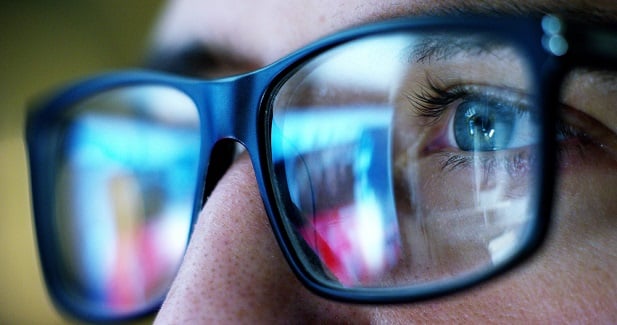 More than six in ten employers now offer a stand-alone vision plan, which could be either insurance or a discount plan. (Photo: Shutterstock)
More than six in ten employers now offer a stand-alone vision plan, which could be either insurance or a discount plan. (Photo: Shutterstock)
As workers log in more screen time, their vision can be detrimentally affected–and so can their productivity, according to Guardian Life's study, "Coming Into Focus: The Role of Vision Benefits and Eye Care in Health & Wellness."
Guardian Life polled 2,000 workers for its 7th Annual Workplace Benefits Study, and found that on average, respondents spend 5.3 hours a day in front of a computer screen. But that average rises to 11.8 hours when time spent on smartphones, tablets and watching television are factored in.
"Increased screen usage appears to be taking a toll on the nation's vision health, with many adults spending most of their day on screens," the authors write. "Even minor vision problems can reduce productivity by up to 20 percent, mainly due to workers with impaired vision needing additional time to complete their work."
Related: Vision problems negatively impacting employee performance
Many suffer from "computer vision syndrome," including eye strain, dry eyes, eye irritation, blurred vision and double vision, according to the study. As such, 70 percent of the survey's respondents consider vision benefits "very important," and four in ten who do not have a vision plan say they would enroll if their employer made it available.
More than six in ten employers now offer a stand-alone vision plan, which could be either insurance or a discount plan, an increase of seven percentage points since 2012.
"Employers offering a vision plan tend to be larger organizations, and they tend to have richer vision benefits compared to smaller firms," the authors write. "Yet a growing number of small businesses are offering vision benefits to help attract and retain talent in today's competitive labor market."
Nearly a third of employers pay the entire cost of their vision plan, up seven percentage points from 2017. Startups are more likely to pay for vision benefits, with 92 percent covering all or part of the cost.
"What can help working Americans and their families to maintain healthy eyes? Practicing good vision hygiene, including getting regular eye exams, updating corrective eyewear prescriptions and protecting eyes from blue and ultraviolet rays are excellent ways to keep good vision health in sight," the authors write.
Guardian Life also recommends that workers practice these measures to reduce blue light exposure:
- Practice 20-20-20 vision by looking at something 20 feet away every 20 minutes for 20 seconds.
- Eliminate screen glare by reducing overhead lighting.
- Keep the screen an arm's distance (about 30 inches) away.
- Increase font size on devices.
- Blink to reduce dry eye, which can cause stinging and burning.
- Use a gel lubricant for the eyes at bedtime to help reduce the effects of dry eye.
© 2025 ALM Global, LLC, All Rights Reserved. Request academic re-use from www.copyright.com. All other uses, submit a request to [email protected]. For more information visit Asset & Logo Licensing.








